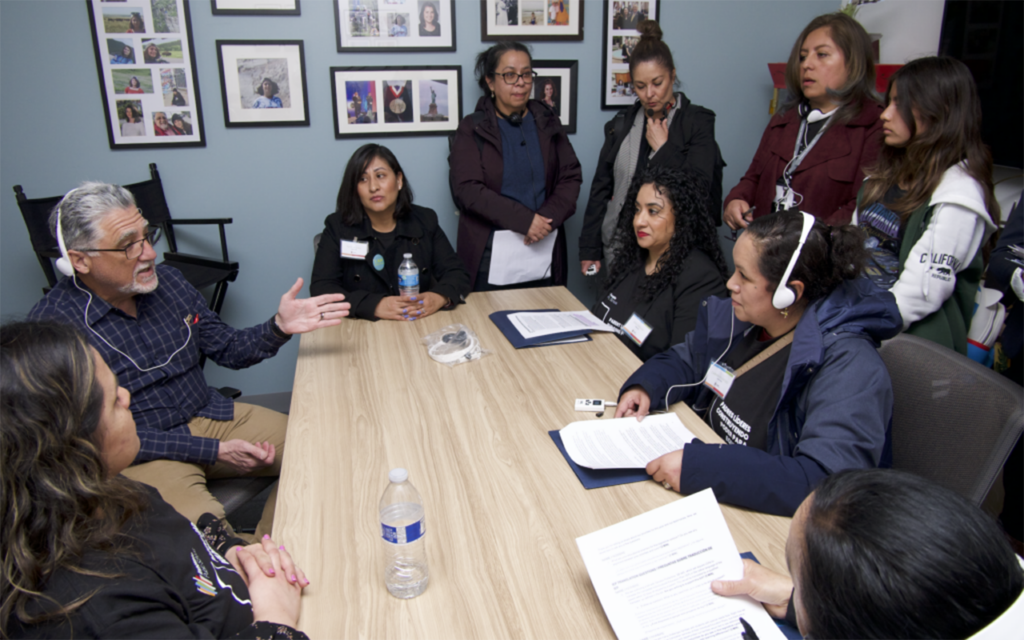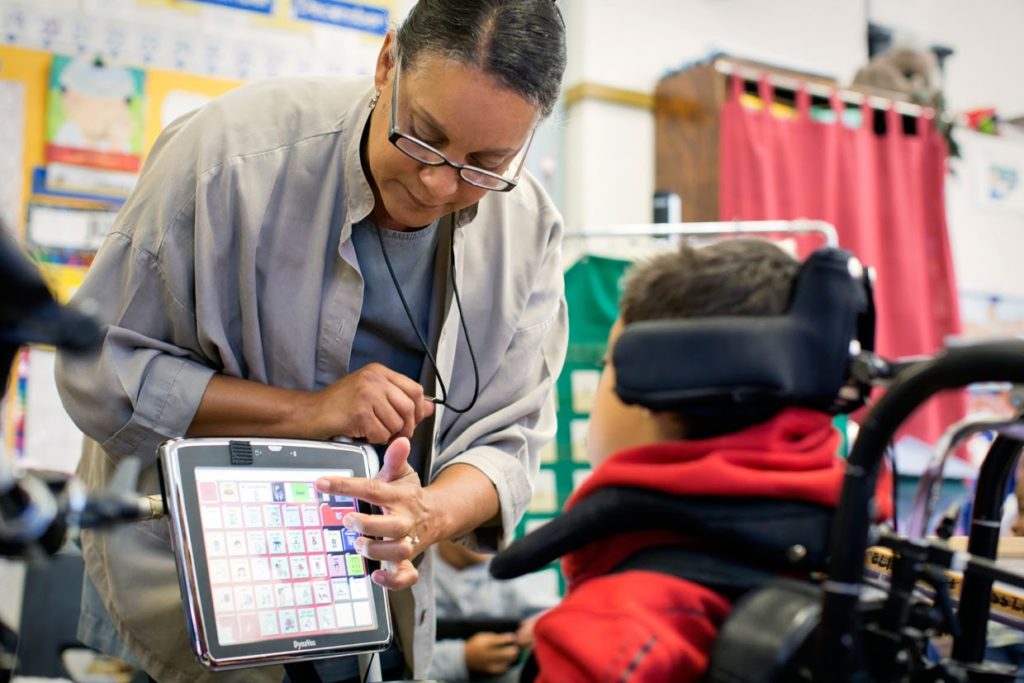
Carmen Rodriguez, seated right, and other parents meet with state Sen. Anthony Portantino in the State Capitol.
Credit: Courtesy of Innovate Public Schools
Este artículo está disponible en Español. Léelo en español.
When Los Angeles mother Tania Rivera signed a crucial document for her son Luis’ special education program in 2022, she was hoping he would be able to return to in-person classes after two years of distance learning.
But the individualized education program, or IEP, required for all children who need special education, was available only in English. Rivera’s first language is Spanish.
Later she was told Luis, who has autism, would have to continue with online learning because the document did not specify that he needed in-person classes. In addition, she says, the document removed his occupational therapy for handwriting because a language interpreter erroneously said she objected.
“It is a big disadvantage that we have, because I have some English, but it is very basic,” Rivera said in Spanish. “If we’re talking about educational terms or legal terms, the meaning can be lost with just one word” mistranslated.
Monthslong waits and faulty or incomplete translations of special education documents are widespread across California for parents who speak languages other than English, according to special education advocates. They say these problems violate parents’ rights to participate in their children’s education plans under the Individuals with Disabilities Education Act, the federal law that regulates special education.
A proposal in the state Legislature, Senate Bill 445, aims to solve some of these problems, but its fate remains uncertain because of concerns over potential cost.
“I’ve never seen a timely translation and I’ve never seen all documents being fully translated,” said Lisa Mosko Barros, founder of SpEducational, an organization that works to educate parents to be advocates for their children with special needs and improve their access to high-quality education. Mosko Barros has worked with dozens of families in Southern California, including Rivera, and trained hundreds of others on navigating the IEP process.
She said she has heard the same complaints over and over.
“I literally spoke to one parent this morning in the Inland Empire who a couple of years ago signed an IEP and didn’t realize she was signing consent to eliminating speech services for her child who is non-verbal with autism,” Mosko Barros said. “It really can make or break a child’s access to a free and appropriate public education.”
Rivera’s son Luis, now in eighth grade, remained in online classes since fifth grade until this fall and regressed as a result, his mother said.
In total, he lost three years of in-person classes, first in 2020-21 when all students had distance learning, again in 2021-22 because he has chronic asthma and his pediatrician recommended he stay home since vaccinations against Covid-19 were not yet available for children. Then, in 2022, the translation problems kept him out of in-person schooling for another year.
“He has had academic setbacks, and socially, he regressed a lot because it was three years without interaction,” Rivera said.
When asked how long the district takes to translate special education assessments and IEP documents, the Los Angeles Unified School District communications team wrote that “the District works to parallel the IEP timeline for consistency and return the translated document within the same 30-day timeframe.” They declined to comment on Rivera’s case.
Rivera and almost 200 other people attended an online meeting in September with state Sen. Anthony Portantino, D-Burbank, at which parents shared how long wait times and poor-quality translations have hurt their children with special needs. They expressed their support for Portantino’s bill, which would require IEPs to be translated into a parent or guardian’s native language by a “qualified translator” within 30 calendar days of an IEP meeting or a later request.
Current federal and state laws require that school districts “take any action necessary” to ensure parents understand IEP meetings, and state law requires they translate a student’s IEP at a parent’s request, but no time frame is specified.
“I believe strongly that parents can best advocate for their children when they have the knowledge to do so. Not being able to read an IEP because of language barriers is unacceptable,” Portantino said. “We must find a way to translate IEPs more quickly.”
Portantino said the issue is personal for him because he struggled with dyslexia and ADHD as a student and received limited help from the schools he attended.
“I largely depended on developing my own learning methods, which included lots of repetition and good listening skills,” Portantino said. But he wants to make sure other children can get the help they need.
The bill passed the Senate, the Assembly Education Committee and the Assembly Appropriations Committee with no opposition. But an analysis by the Assembly Appropriations Committee found that the bill could cost the California Department of Education $409,000 annually and could cost school districts between $6 million and $16 million, which might also have to be reimbursed by the state. Believing there was a risk the bill could be vetoed this year because of those costs, Portantino said he chose to make it a “two-year bill,” giving it more time to be discussed in the Legislature and with Gov. Gavin Newsom.
San Francisco Unified School District passed a policy in 2022 to ensure “every effort shall be made” to translate special education documents before meetings so that parents have time to read and understand them. It also requires meeting times to be extended to allow for interpretation.
Carmen Rodríguez is one of dozens of parents who pushed for that policy. Rodríguez has two children with disabilities. Before the San Francisco Unified policy passed, she said, she waited eight months for a written translation of the first assessment of her older son, who has anxiety and a learning disability, and a year for the IEP for her younger child, who has dyslexia.
“If it’s not in my language, how am I going to understand the document? How do I know that it really says here what my child needs?” Rodríguez said in Spanish.
In addition, she said IEP meetings were often cut short because the district limited them to one hour, with no extra time allowed for interpretation.
Belén Pulido Martínez, senior community organizer for Innovate Public Schools, an organization that worked to get the San Francisco policy passed, said the policy empowers parents.
“Now in San Francisco, the district is training their special ed teachers on the policy, and we’re super happy about that because it’s not just a piece of paper that’s going to die in an office. It’s being implemented,” Martínez said.
Matt Alexander, the San Francisco Unified Board of Education commissioner who worked with parents to write the policy, said school districts have to prioritize translation and interpretation if they want parents to be engaged.
“In our district, over half of our families don’t speak English at home. So if we care about communicating with our families, we have to provide interpretation,” Alexander said. “Step one is, have a clear policy. Step two is, make sure you’re being accountable to families who are directly impacted. Is it working? How do we make it better?”
Rodríguez said since the San Francisco policy passed, several other mothers have thanked her. She said she would love for SB 445 to pass so parents in other districts can also benefit.
“So many children in many different places, many different schools, are not receiving the support they deserve, and their parents have to battle to get an evaluation and to get documents translated, and they find it really hard,” Rodríguez said. “It’s a really, really long document, and it’s a long process. And if it’s in our language, then it will be much easier for us parents to process and understand the document and the evaluation given to our children.”


